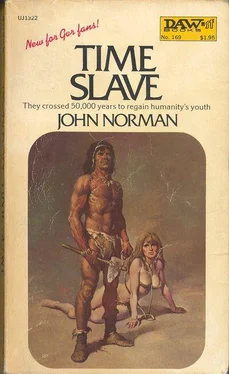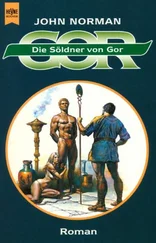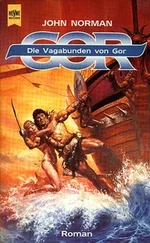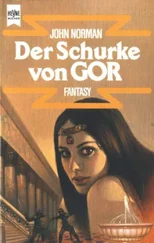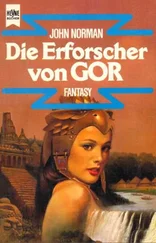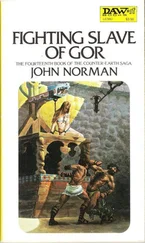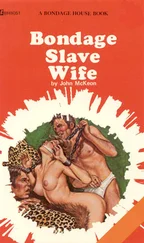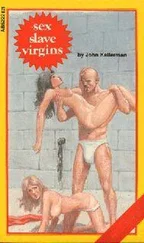Flower shook with fury, and then went and knelt behind Fox. He threw her a piece of meat. She picked it up, and, angrily, ate it.
Then Hamilton extending her neck, took the piece of hot, juicy meat which Tree thrust between her teeth.
Chewing it, she smiled at Flower, who looked angrily away.
Hamilton wondered why she, a runaway girl, had not been dragged before Spear, to see if she would be permitted to live.
She had not seen Spear, nor Knife, since she had come to the camp. She had not seen, either, the small, darkhaired girl who had been taken from the Weasel People.
Butterfly had gathered apples. She gave Hamilton one. Hamilton handed the apple to Tree, who ate it.
Late that night, after Hamilton had been much used by the hunter, Tree, she crept to Old Woman.
“Where is Spear?” she asked.
“He is dead,” said Old Woman, who sat by a fire, poking it with a stick.
Hamilton did not speak.
“Knife,” she said, “killed him. He had tried before, twice. Then he was successful. He wished to be first. He went to his side in the night and, with the ax of Tree, broke open his head. He left the ax beside Tree, that the Men might think this had been done by Tree.” Old Woman jabbed the fire, and sparks flew up. “But Spear,” she said, “was not dead. He is hard to kill. Some say Spear is not dead yet. He had not been asleep. He knew, sometime, Knife would kill him. He waited. He did not cry out. But in the morning, before he died, he told the Men it was not Tree, but Knife, who had done the thing. But the Men knew Tree would not do it. Only Knife would do it. Knife was foolish. He was not wise, not cunning, like Spear. He did not have Spear’s intelligence. He was not Spear.”
“Was Knife killed?” asked Hamilton.
“Do not kill Knife, said Spear,” said Old Woman. “I care for him. I love him, said Spear. He is of my body. I love him, said Spear.” Old Woman stirred the ashes. The reflection, red, was on her chin and upper lip, glowing in the wrinkles. “He is not bad, said Spear. He only wants to be first.”
“What happened?” asked Hamilton.
“Tree sent Knife away,” said Old Woman. “He gave him a woman, too, to take with him, the brown-haired girl, from the Weasel People.”
“Why did he do that?” asked Hamilton.
“So that Knife would have a woman,” said Old Woman. “Spear would have wanted Knife to have a woman.”
Hamilton said nothing.
Old Woman looked up, to one of the ledges, where there was a dark hole in the face of the cliff. No fire burned there. It had been the shelter of Spear. None lived there now. “Some say,” said Old Woman, “that Spear did not die, that he could not be killed. Some say he sits, even now, in the cave, in the darkness.” Old Woman turned to Hamilton. “Mothers,” said she, “frighten their children with Spear. They say, be good, or Spear will get you. Some think Spear is not dead.”
“But that is foolish,” said Hamilton.
Old Woman shrugged. “Hyena,” she said, “says Spear is not dead.”
“That is foolish,” said Hamilton.
“He says he has seen him,” said Old Woman.
“In dreams,” said Hamilton.
“And once by the river,” said Old Woman.
Old Woman thrust a brand in the fire. “Come,” she said. “We will look.”
Hamilton glanced at her, frightened.
“Are you afraid of Spear?” asked Old Woman.
“Aren’t you?” asked Hamilton.
“I am too old to be afraid,” she said. “Come with me.”
“But what if Spear is not dead?” asked Hamilton.
But Hamilton followed Old Woman, who, stiffly, climbing, limping, made her way to Spear’s ledge.
She entered the cave, the brand high. The cave was empty. “Spear is dead,” said Old Woman.
Then she turned about, and left the cave. “We must not fear Spear,” she said. “Spear was a great man. We must remember Spear and love him.”
“I thought you hated Spear,” said Hamilton. “He killed Drawer, when he was blind and Old Man.”
Old Woman looked up at Hamilton. Her eyes were moist. “Stone told me,” she said, “after Spear died, wanting me to know, though he would not say this while Spear lived, because I am a woman, and because Spear did not want the Men to know.”
“What?” asked Hamilton.
“When Drawer could not hunt, when he went blind, and could not draw, he could only eat and be led about, and he did not wish to be a burden on the Men.” Old Woman’s voice broke. “He told Spear to kill him.”
Hamilton was silent.
“For a long time, Spear did not do this thing. Then, one day, he did it. For a long time only Spear, and Stone knew, and then, after Spear died, Stone told me. Spear would not tell me. He was first among the Men. I tell you.” Old Woman’s voice choked. “Drawer wanted me to be fed,” she said. “I would have starved, or eaten scraps, or stolen,” she said. “When he died, I became Old Woman. The meat was mine to cook. I would eat.” Old Woman sobbed. “Spear,” she said, “was a great man. Let us not fear him. Let us remember him and love him.”
“The memory of Spear,” said Hamilton, “will be twisted into an insanity by Hyena.”
“Hyena is Hyena,” said Old Woman, shrugging. “He cannot help himself.” She then hobbled from the cave of Spear. She descended to the ledge of her own fire. There she lit another brand. “In the morning,” she said, “the Men trek. Tree has decided it. We will leave these shelters and seek others.”
Hamilton was startled. Had she so narrowly accomplished her rendezvous with the Men? Then she recalled the young man in Copenhagen, with the young, blond woman. The rendezvous had been accomplished.
“Follow me,” said Old Woman, holding aloft a second brand. For the second time in her life, timidly, Hamilton followed Old Woman through the tunnels to the cave of the Men. Women were not permitted there, but Old Woman, as was her custom, gave little consideration to such strictures.
At last they stood in the lofty cave. The drawings which had once decorated the walls, the bison, the cave lion, the bear, the antelopes, the great mammoth, had been effaced by the Weasel People.
“I am sorry, Old Woman,” said Hamilton. “It was I who, fleeing, led men of the Weasel People to this place. It was I who was responsible for the destruction of the work of Drawer.”
Old Woman sniffed. “We are leaving the shelters,” she said. She poked about, on the floor of the cave. Then she bent down, and seized up the rock, the large, flattish pebble she had been looking for. Hamilton remembered it. On it, in overlaid marks, a complex variety, almost indecipherable, of precise, flowing lines, were the images of the animals which had roamed and fought and fled in vibrant color on the sloping walls of the cave. “They are here, the animals,” cackled Old Woman, “in this rock. Drawer put them here.” She held the rock, and pressed it to her thin lips. “I will take it with me,” she said.
“They will know you were in the Men’s cave,” said Hamilton.
“Let them kill me,” said Old Woman. “But they will not do it. They are only Men and they need Old Woman. And I will hide it.” She looked up at Hamilton. “When I die,” said Old Woman, “I will give it to you. Give it to your sons. In the new shelters, when they are hunters, let them use this rock. Let them there, on the walls of the new home of the Men, release the animals. Let them free them of the stone where Drawer put them.”
“The stone was where Drawer practiced,” said Hamilton.
“Do not be stupid,” said Old Woman. “They are here, all the animals, and each one once, and perfectly. Do you think there was only one flat stone in the country of the Men?” She laughed. “No,” she said. “Drawer made this stone for the sons of his sons. It is Drawer’s stone, for his sons. The Men have always trekked. It is their nature, in the times of the fathers or the sons. And Drawer made this stone, that he might, always, with them, join in the trek. As long as this stone, or these images, survive, Drawer treks with the men. It is his work, this stone. Men will keep this memory, of Drawer, no matter how far they go, no matter how remote the lands to which they make their treks.” Old Woman grinned. “As long as I live,” she said, “I will keep this stone, for love of Drawer. When I die, I will give it to you. Give it to your sons. Tell them Drawer made it.”
Читать дальше
